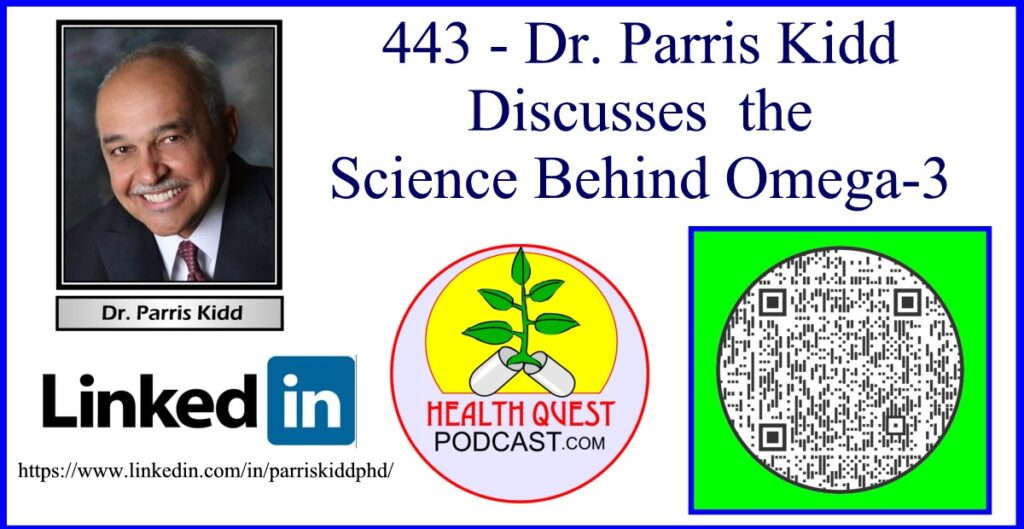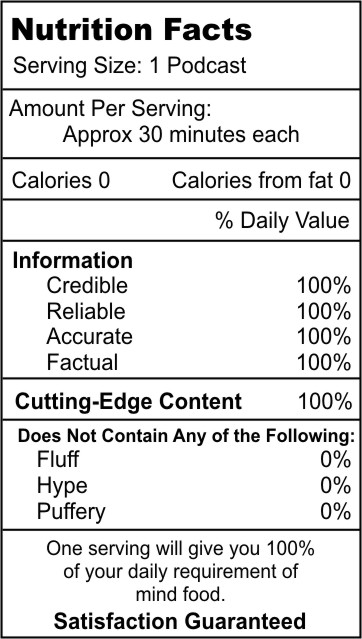Podcast: Play in new window | Download (Duration: 54:52 — 100.9MB)
Nutritional Health Insurance: Everyone should take Omega-3 EPA & DHA
EPA and DHA, two essential omega-3 fatty acids, are crucial for overall health and can benefit individuals of all ages and stages in life. Dr. Parris Kidd, a renowned expert in dietary supplements, emphasizes the importance of EPA and DHA in a podcast episode, highlighting their vital role in various bodily functions for optimal health.
- Prenatal and Childhood Development: EPA and DHA are particularly important during pregnancy and early childhood. Pregnant women require adequate levels of these fatty acids for the healthy development of the fetus’s heart, brain, and nervous system. Children also benefit from EPA and DHA for vision development, behavior, learning, and mood regulation.
- Brain Health and Cognitive Function: Throughout life, EPA and DHA are essential for maintaining optimal brain function. These fatty acids support nerve cell communication, neurotransmitter release, and receptor function in the brain. Research indicates that higher omega-3 index levels are associated with better cognitive function, memory, and mood regulation.
- Cardiovascular Health: Numerous studies have demonstrated the cardiovascular benefits of EPA and DHA. These fatty acids help reduce the risk of heart disease, stroke, and high blood pressure. Consuming adequate amounts of EPA and DHA can improve heart health, lower triglyceride levels, and reduce the risk of cardiovascular events.
- Athletic Performance and Muscle Recovery: Athletes can also benefit from EPA and DHA supplementation. These fatty acids have been shown to improve mental performance, energy levels, and mood in athletes. Additionally, EPA and DHA can aid in muscle recovery following exercise by reducing inflammation and muscle soreness.
- Vegetarian and Vegan Options: High-quality EPA and DHA supplements derived from cultured algae are available for individuals following a vegetarian or vegan diet. These supplements provide a plant-based source of essential omega-3 fatty acids, ensuring that individuals who do not consume fish can still meet their EPA and DHA requirements.
In conclusion, EPA and DHA are fundamental for maintaining overall health and well-being at every stage of life. Whether supporting prenatal development, enhancing cognitive function, promoting heart health, aiding in athletic performance, or providing vegetarian-friendly options, incorporating EPA and DHA into one’s daily routine can have significant benefits for individuals of all ages.
When purchasing EPA and DHA supplements, it is crucial to carefully read labels to ensure the right dosage and quality. Dr. Kidd emphasizes the importance of checking labels to confirm a daily intake of at least 1,000 milligrams of EPA and DHA, with larger individuals potentially needing more.
Dr. Kidd also mentions the need to look for added antioxidants in the supplements to keep the product stable and prevent oil degradation before consumption. Additionally, he advises that if you purchase a liquid product, it should be kept refrigerated but not frozen to maintain quality.
By carefully reading labels, consumers can ensure they are getting the necessary dosage of EPA and DHA to reap the health benefits associated with these essential fatty acids.
Core Supplement Program for Nutritional Health Insurance
In the podcast episode with Dr. Parris Kidd, he emphasizes the importance of a core supplement program as a form of nutritional health insurance. This program consists of three key components:
- Vitamin D3: Dr. Kidd recommends a daily intake of 4,000 to 5,000 international units of vitamin D3. Vitamin D is essential for various bodily functions, including bone health, immune system support, and mood regulation. Adequate levels of vitamin D are crucial for overall well-being, especially for individuals who may not get enough sunlight exposure to naturally produce vitamin D.
- High-Quality Multiple: The second component of the core supplement program is a high-quality multiple. Dr. Kidd outlines eight criteria for selecting a reliable multiple supplement, ensuring that it provides a comprehensive range of essential vitamins, minerals, and nutrients to support overall health and fill potential nutritional gaps in the diet.
- Omega-3 EPA and DHA: The third essential component of the core supplement program is omega-3 fatty acids, specifically EPA and DHA. Dr. Kidd recommends a daily intake of 1,000 to 4,000 milligrams of EPA and DHA. These omega-3 fatty acids play a crucial role in supporting heart health, brain function, mood regulation, and overall well-being. They are particularly important for individuals who do not consume sufficient amounts of cold-water fish in their diet.
By incorporating these three components into a daily supplement regimen, individuals can establish a strong foundation for their nutritional health. This core supplement program acts as a form of nutritional health insurance, providing essential nutrients that may be lacking in the diet and supporting optimal health and well-being. It is a proactive approach to ensuring that the body receives the necessary vitamins, minerals, and fatty acids to function optimally and maintain overall health.
Listen to all interviews with Dr. Kidd
Dr. Parris Kidd

Dr. Kidd is a pioneer in the dietary supplement field. He earned his PhD from the University of California at Berkeley, and after doing heart research at the University of California San Francisco Medical Center developed a strong interest in “alternative medicine.” That led to his writing a pioneering 500-page textbook on antioxidants with Dr. Stephen Levine, founder of Allergy Research Group. He has now worked with dietary supplements for over 40 years, and has developed numerous products some of which won industry awards. He has published and lectured around the world on the science behind supplements, his media features are prominent on YouTube, and he has millions of Google mentions. Dr. Parris Kidd is highly respected for his exemplary contributions to building the scientific knowledge base of nutritional medicine.











{ 0 comments… add one now }